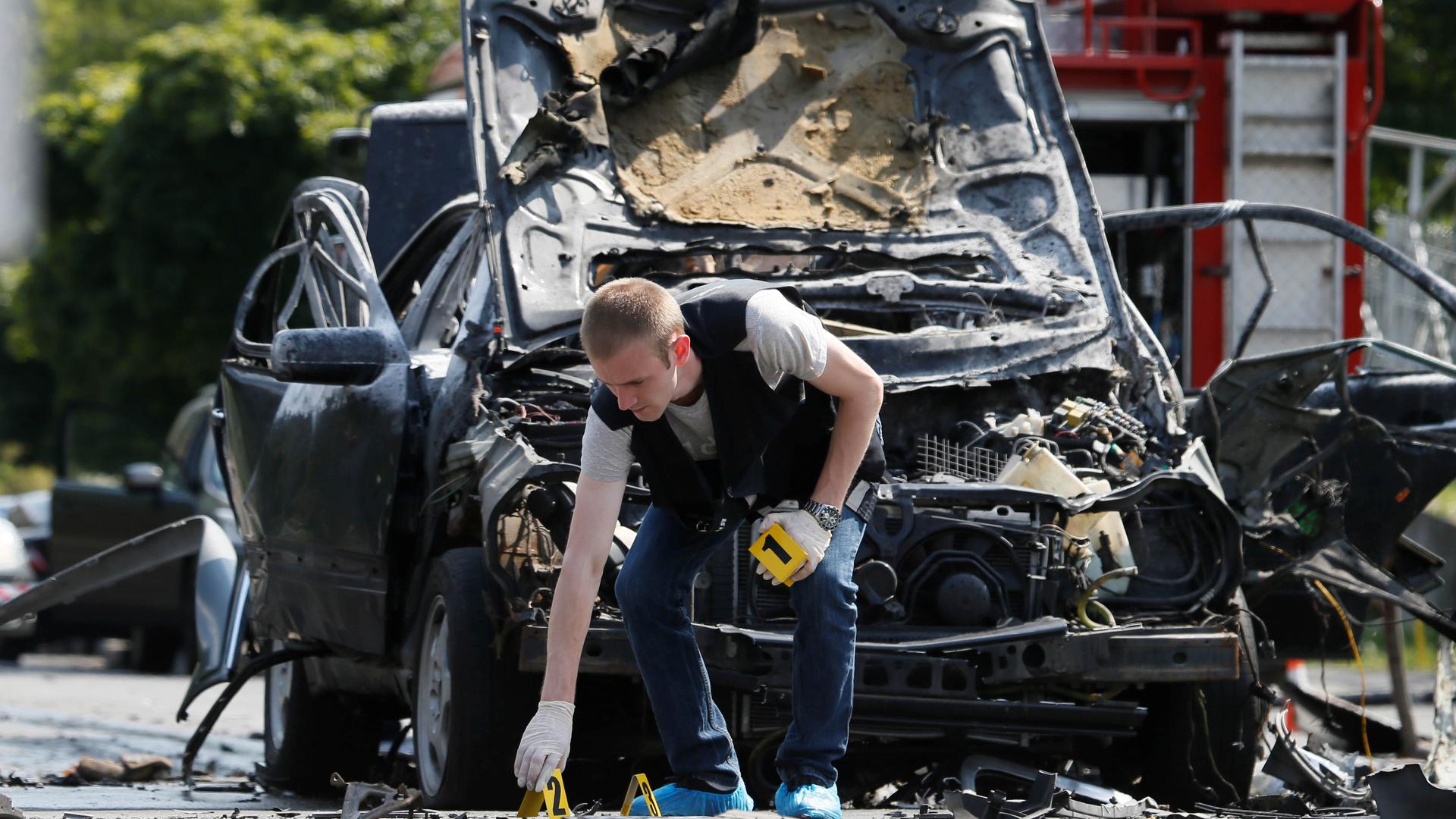An investigator works at the scene of a car bomb explosion that killed Maksym Shapoval, a high-ranking Ukrainian official involved in military intelligence, in Kiev, Ukraine, June 27.
An explosion that killed a top Ukrainian military intelligence official in his car on Tuesday wasn’t the only high-profile assassination that’s struck Kiev lately.
In fact, the killing of Col. Maskym Shapoval wasn’t even the only car bomb attack — nor the only assassination the Ukrainian government has blamed on Russia.
At least five attempted or successful assassinations have targeted Ukrainian officials or other prominent figures in Ukraine in the past year.
The country is struggling with political turmoil, corruption, and against Russia-backed separatists in two eastern regions. But it’s now also facing outbursts of the sort of brazen violence more typical of the tumultuous 1990s, when power struggles would often play out on the streets of Eastern Europe after the collapse of the Soviet Union.
Times have changed and, for the most part, internal politics appeared to no longer be settled that way. But following recent attacks, Ukrainian officials and analysts are looking beyond their borders — largely at Russia — for the source of the violence they say aims to cause chaos in their country.
The Kremlin regularly denies stoking instability in Ukraine.
The victim of Tuesday’s attack, Col. Shapoval, served in an elite Defense Ministry intelligence unit that carried out operations against pro-Russia insurgents in eastern Ukraine. Police say he was killed by an explosive device placed under his car. They’re treating it as a “terrorist act.”
It follows the assassination last March of Denis Voronenkov, an outspoken former Russian lawmaker who was gunned down in front of a luxury hotel in Kiev. Voronenkov became openly critical of the Kremlin after he moved to the Ukrainian capital late last year.
And a year ago, a mysterious blast killed respected Belarusian-Russian journalist Pavel Sheremet at a downtown intersection — a stone’s throw from foreign embassies and government buildings.
In all these cases, authorities have pointed to a “Russian trail,” a phrase that’s become a seemingly ubiquitous part of investigations into acts of high-level violence and sabotage in Ukraine.
In addition to fueling the 3-year-old uprising in eastern Ukraine, the Kremlin has waged what experts say is a “hybrid war” against its smaller neighbor, combining conventional warfare with a powerful propaganda campaign and alleged cyberattacks — similar to the one that disrupted government computers, banks, and other prominent targets this week, before spreading globally.
Related: Russia has been testing cyberwarfare techniques on Ukraine since 2014. What’s next?
“[Shapoval’s] death reminds us that the war takes place not only at the front,” Ukrainian President Petro Poroshenko said at the officer’s funeral on Friday. “Terrorist attacks committed by the aggressor, who arrived on our land armed, can happen anywhere.”
Whoever the culprits, the attacks are a disturbing new reality in an otherwise vibrant city that’s also growing more cosmopolitan, even despite the sporadic violence.
Ukraine’s economy is still suffering after a 2014 street revolution ousted a corrupt government and precipitated Russia’s invasion of Crimea and the east. Nevertheless, Kiev is packed with sleek cocktail bars, cool coffeehouses and a burgeoning art scene — all signs that life here goes on, political instability and war be damned.
In fact, Ukraine experienced a burst of cultural activity and an increasingly dynamic nightlife scene alongside the Maidan revolution, according to Adam Howell, an American expat in Kiev who owns two popular bars in the capital. Few patrons come to his cocktail joints to talk politics.
Going out, Howell says, has become an escape for many young Ukrainians from the turmoil that grips their country on a regular basis. “It always has been,” he says, “and probably always will be.”
